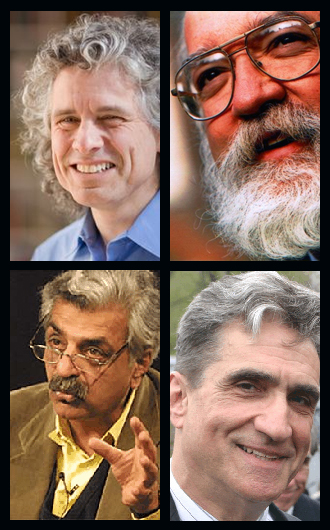June 21, 2010, UPDATE: The winners have been announced.
June 11, 2010, UPDATE: See list of nine finalists here.
June 8, 2010, UPDATE: Voting round closed. See list of twenty semifinalists here.
June 2, 2010, UPDATE: Nominations are now closed. Go here to see the list of nominees and vote.
May 31, 2010, UPDATE: Today is the last day for nominations.
Dear Readers, Writers, Bloggers,
 A year ago we announced that we would start awarding four sets of prizes every year (on the two solstices and the two equinoxes) for the best blog writing in the areas of science, philosophy, politics, and arts & literature. We awarded the science prizes, judged by Steven Pinker, on June 21, then announced the winners of the philosophy prizes, judged by Daniel C. Dennett, on September 22, followed by the politics prizes, judged by Tariq Ali, for which the winners were announced on December 21, and finally, the arts & literature prizes were judged by Robert Pinsky, and the winners announced on March 22, 2010.
A year ago we announced that we would start awarding four sets of prizes every year (on the two solstices and the two equinoxes) for the best blog writing in the areas of science, philosophy, politics, and arts & literature. We awarded the science prizes, judged by Steven Pinker, on June 21, then announced the winners of the philosophy prizes, judged by Daniel C. Dennett, on September 22, followed by the politics prizes, judged by Tariq Ali, for which the winners were announced on December 21, and finally, the arts & literature prizes were judged by Robert Pinsky, and the winners announced on March 22, 2010.
Thus we completed our first annual cycle of prizes having exceeded our own expectations of success: through our contests we found, for our readers as well as for ourselves, great new blogs and writers to read and follow, and the quality and range of the submissions was excellent in general. And we hope that in our own small way we also managed to spur and encourage good writing in the blogosphere by acknowledging and rewarding it. We are proud that well-known and highly accomplished experts agreed to serve as final judges for each of the four sets of prizes in the first year. We thank each of them again.
 We are now ready to start the second cycle of annual prizes, and could not be more excited that Professor Richard Dawkins has agreed to judge the second annual science prize. Since we hardly ever mention him here at 3 Quarks, and many of you may not know who he is, let me say a few words to introduce him… Please, I am joking! I do actually, and very seriously, wish to say this: we could not have found a better judge for science writing, as in my opinion as well as that of many, many others, Richard is simply the best science writer of our time. We are very honored to have him.
We are now ready to start the second cycle of annual prizes, and could not be more excited that Professor Richard Dawkins has agreed to judge the second annual science prize. Since we hardly ever mention him here at 3 Quarks, and many of you may not know who he is, let me say a few words to introduce him… Please, I am joking! I do actually, and very seriously, wish to say this: we could not have found a better judge for science writing, as in my opinion as well as that of many, many others, Richard is simply the best science writer of our time. We are very honored to have him.
As usual, this is the way it will work: the nominating period is now open, and will end at 11:59 pm EDT on May 31, 2010. There will then be a round of voting by our readers which will narrow down the entries to the top twenty semi-finalists. After this, we will take these top twenty voted-for nominees, and the four main editors of 3 Quarks Daily (Abbas Raza, Robin Varghese, Morgan Meis, and Azra Raza) will select six finalists from these, plus they may also add up to three wildcard entries of their own choosing. The three winners will be chosen from these by Richard.
The first place award, called the “Top Quark,” will include a cash prize of one thousand dollars; the second place prize, the “Strange Quark,” will include a cash prize of three hundred dollars; and the third place winner will get the honor of winning the “Charm Quark,” along with a two hundred dollar prize.
* * *
(Welcome to those coming here for the first time. Learn more about who we are and what we do here, and do check out the full site here. Bookmark us and come back regularly, or sign up for the RSS feed.)
* * *
 Details:
Details:
The winners of the science prize will be announced on June 21, 2010. Here's the schedule:
May 24, 2010:
- The nominations are opened. Please nominate your favorite science blog entry by placing the URL for the blog post (the permalink) in the comments section of this post. You may also add a brief comment describing the entry and saying why you think it should win.
- Blog posts longer than 4,000 words are not eligible.
- Each person can only nominate one blog post.
- Entries must be in English.
- The editors of 3QD reserve the right to reject entries that we feel are not appropriate.
- The blog entry may not be more than a year old. In other words, it must have been written after May 23, 2009.
- You may also nominate your own entry from your own or a group blog (and we encourage you to).
- Guest columnists at 3 Quarks Daily are also eligible to be nominated, and may also nominate themselves if they wish.
- Nominations are limited to the first 200 entries.
- Prize money must be claimed within a month of the announcement of winners.
- You may also comment here on our prizes themselves, of course!
May 31, 2010
- The nominating process will end at 11:59 PM (NYC time) of this date.
- The public voting will be opened soon afterwards.
June 7, 2010
- Public voting ends at 11:59 PM (NYC time).
June 21, 2010
- The winners are announced.
And another Mini-Contest!
For each of our contests, I have asked designer friends of mine to produce “trophy” logos that the winners of that prize can display on their own blogs. You can see all of them here. I am now running out of designer friends, so here is an offer: send me your design for a logo for the winners of the Arts & Literature Prize (it must contain the same info as in the examples I have linked to, and the size is 160 X 350 pixels), and if I use it, I'll send you $25. Try. It'll be fun. Deadline: June 10, 2010.
One Final and Important Request
If you have a blog or website, please help us spread the word about our prizes by linking to this post. Otherwise, post a link on your Facebook profile, Tweet it, or just email your friends and tell them about it! I really look forward to reading some very good material, and think this should be a lot of fun for all of us.
Best of luck and thanks for your attention!
Yours,
Abbas
